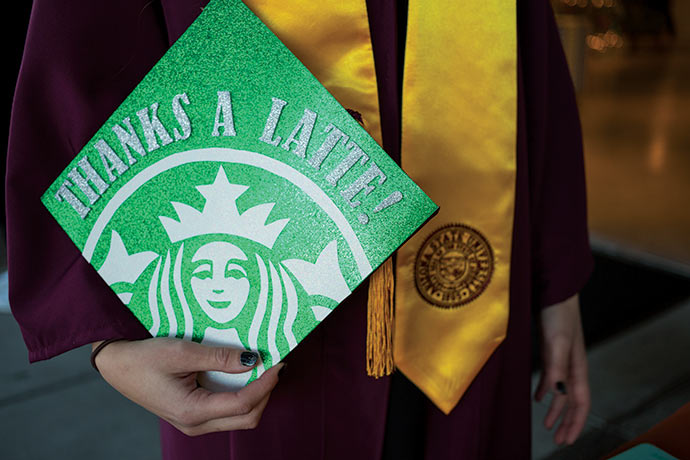You might want to appreciate your favorite baristas at the neighborhood coffee shop while they’re still working behind the counter.
Starbucks and Arizona State University have expanded their partnership to offer the coffee chain’s employees more opportunities for higher education. The new Pathway to Admission program expands on the existing Starbucks College Achievement Plan that reimburses employee tuition. The new program allows employees with less-than-stellar academic achievements the opportunity to earn admission to ASU by completing digital courses through the ASU Global Freshman Academy.
“Regardless of your test scores, regardless of your history, everyone at Starbucks is now going to have access to a free college education,” Starbucks CEO Howard Schultz said while announcing the program to shareholders in June. Schultz noted the program will help the coffee chain reach its goal of launching the careers of 25,000 college graduates by 2025.
Starbucks will cover the cost of the courses in the new program but students will be required to pay a $49 fee for each course. Most students will take between four and eight classes based on academic history before being able to enroll in a degree program. The online courses are taught by the same instructors who teach on campus in Tempe.
“This program is a clear expression of Starbucks’ commitment to its partners and ASU’s continuing mission to use technology to broaden access to higher education and empower more individuals to obtain a college degree,” ASU President Michael Crow said.
But this partnership isn’t the only bit of ASU news making headlines. US News and World Report ranked ASU the No.1 most innovative school in the country in 2015 and 2016. The Wall Street Journal ranked ASU graduates as being No. 5 in the nation for best-qualified graduates.
More than 2,000 students graduated from the Ira A. Fulton Schools of Engineering during the spring semester. The engineering program is exceptionally large with some 20,000 students currently enrolled and 3,500 degrees awarded in 2016. ASU offers engineering students 24 undergraduate and 39 graduate degree programs across both campuses and online.
Kyle Squires, Dean of ASU’s Ira A. Fulton Schools of Engineering, says the university is doing a lot of help close the skills gap and create a strong talent pipeline for industries both in the region and nationally.
“That phrase ‘skills gap’ is meaningful in the sense that it’s not — I would claim— necessarily a jobs shortage, but a skills shortage,” Squires said. “And there are two ways we have to address that. One is by making sure the students we prepare are ready to engage (with employers), but increasingly, you’ve got existing workforce out there in the valley and beyond and they need to retool their skills.”
Squires noted the university is working closely with industries to make sure students are developing the skills they need and said new offerings will begin to roll out as soon as the fall semester.
Obtaining a degree or certificate is par for the course for students in Arizona, and the Phoenix region in general. Indeed, employers easily find a skilled and educated talent pool. There are more than 50 universities and institutes of higher learning in the region.
Maricopa Community Colleges educates 265,000 people each year across its 10 campuses. In February, the college partnered with Pima Community College and Central Arizona College to create the Arizona Advanced Technologies Corridor project. More than 157,000 people in Arizona are employed in the manufacturing industry or are in manufacturing-related positions. There is a growing manufacturing hub located along the I-10 corridor from Phoenix to Tucson.
This project will help the community college systems prepare students to join the advanced manufacturing workforce by standardizing curriculum across the campuses. The colleges are working with employers like Boeing and Raytheon — which recently announced the creation of 2,000 new jobs in Tucson— to develop the curriculum. The program is expected to launch in the 2017 fall semester.
“In establishing the Advanced Technologies Corridor, our three community college systems are taking a leadership role in providing an innovative, regional approach to respond to employer workforce needs and market demands. In doing so, we can better serve our students by providing clearer pathways to good jobs that are more seamless and not limited by geographic and governmental boundaries,” said Dr. Maria Harper-Marinick, chancellor of the Maricopa County Community College District. “To do this, we plan to engage technology, automotive and advanced manufacturing companies so that we can understand their training needs — for existing employees and for the pipeline of skilled workers they will employ in the future.”

